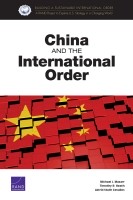 China is employing programs of direct propaganda and disinformation, similar to Russian disinformation efforts, according to a new analysis from the RAND Corporation. Beijing’s Communist authorities are likely to “step up efforts to challenge norms favoring liberal democratic values,” the report adds.
China is employing programs of direct propaganda and disinformation, similar to Russian disinformation efforts, according to a new analysis from the RAND Corporation. Beijing’s Communist authorities are likely to “step up efforts to challenge norms favoring liberal democratic values,” the report adds.
“China’s burgeoning power is already intensifying competition with the United States for leadership and influence within the international system,” so Beijing “may also step up efforts to challenge norms favoring liberal democratic values that it has long opposed,” it adds:
China’s behavior has become increasingly opposed to the liberal norms of the postwar order. This trend looks likely to continue in the medium-term future, increasingly powered by the deployment of a range of Orwellian technologies that provide an authoritarian government with an unprecedented ability to monitor social activity.
 Beijing’s foreign influence operations are “emerging as integrated campaigns using multiple tools, from coercion of individuals to broad trade ties, to affect the political and social context of other countries,” adds the report, China and the International Order.
Beijing’s foreign influence operations are “emerging as integrated campaigns using multiple tools, from coercion of individuals to broad trade ties, to affect the political and social context of other countries,” adds the report, China and the International Order.
“To the extent that this campaign accelerates and comes to reflect a broad-based assault on other societies, it will place China in a far more adversarial position relative to the existing multilateral order,” the RAND researchers state, citing “programs of direct propaganda and disinformation targeted at key states specifically in Asia, similar in character (if not yet volume) to Russian disinformation efforts”:
These efforts increasingly feature the same type of bot-driven computational propaganda as Russia’s efforts and reportedly employ “troll farms” that pay large numbers of individuals to run fake accounts on social media platforms. They include efforts to extend Chinese influence into Western universities and academia, both by  restricting what is said and published about China and establishing an Orwellian system by which Chinese students abroad monitor one another for the ideological content of their comments—even in classrooms. The campaigns feature direct bribery and coercion of individuals and politicians in other countries, including a recent well-publicized case in Australia. The efforts include the use of economic investments to gain influence, employing donations from Confucius Institutes and other NGOs to shape public debate in target countries.
restricting what is said and published about China and establishing an Orwellian system by which Chinese students abroad monitor one another for the ideological content of their comments—even in classrooms. The campaigns feature direct bribery and coercion of individuals and politicians in other countries, including a recent well-publicized case in Australia. The efforts include the use of economic investments to gain influence, employing donations from Confucius Institutes and other NGOs to shape public debate in target countries.
“Because China is unlikely to surpass the United States by virtually any measure of national power any time soon, China is unlikely to displace the United States as the global norm-setting power,” the report states.
 A strategy to counter what a National Endowment for Democracy report describes as Beijing’s ’sharp power’, according would include “encouraging China to uphold the rules, norms, and institutions of a shared order—while working simultaneously to sustain the coalition of mostly like-minded democracies at the core of that order,” the report suggests.
A strategy to counter what a National Endowment for Democracy report describes as Beijing’s ’sharp power’, according would include “encouraging China to uphold the rules, norms, and institutions of a shared order—while working simultaneously to sustain the coalition of mostly like-minded democracies at the core of that order,” the report suggests.
Chinese leaders and thinkers like Niu Xinchun, a scholar at the Ministry of State Security’s Chinese Institute for Contemporary International Relations (CICIR), criticize the liberal norms and values that underpin the international order as ‘a Western political ideology.’ Reflecting a suspicion widespread in Chinese media commentary and academic writings, Niu accused the United States of attempting to “incorporate and tame China” through its Western political ideology, the report adds:
Chinese leaders also oppose norms that legitimize foreign intervention, such as the “responsibility to protect,” democracy and human rights promotion, and freedom of information, fearing that foreign countries will use these tools to undermine the CCP’s authority or Chinese efforts to unify with Taiwan.
 Accordingly, China is “promoting a set of values, principles, and norms that it regards as better suited to the needs of an international order featuring greater parity in power between the West and non-West,” the report adds. “Officials and scholars recommend a passive, non-confrontational advocacy of values, norms, and ideals that accept a low level of international consensus over controversial issues such as human rights and democracy while constraining the power of Western powers to intervene in the internal affairs of weaker states.”
Accordingly, China is “promoting a set of values, principles, and norms that it regards as better suited to the needs of an international order featuring greater parity in power between the West and non-West,” the report adds. “Officials and scholars recommend a passive, non-confrontational advocacy of values, norms, and ideals that accept a low level of international consensus over controversial issues such as human rights and democracy while constraining the power of Western powers to intervene in the internal affairs of weaker states.”
The ruling Communist Party has “moved away from its earlier emphasis on socialist ideology and toward economic growth and competent governance as its source of legitimacy,” the RAND researchers note. “This successful shift toward performance-based legitimacy has strengthened the party’s grip on power, despite its nominal adherence to an antiquated Marxist ideology and Leninist politics,” the report adds, citing Andrew J. Nathan’s article on “Authoritarian Resilience” in the Journal of Democracy.







